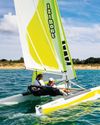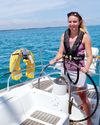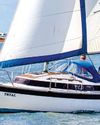
Anchoring a multihull with success requires choosing the correct location, having the right anchor for the boat size and bottom conditions, setting the correct chain and rode arrangements and ensuring you bury the anchor effectively.
There is no anchor that covers all bottom conditions. Most multihulls should carry two anchors of different types. The classic brands come with recommended weights for yacht length-but also consider how much windage your multihull makes. Don't underestimate the required anchor weight because your multi-hull is lighter than a monohull of equivalent length.
Multihulls put a different load on anchors as they sail on the mooring line.
Windage is important when selecting the anchor size. Some multihulls are aerodynamic and low windage. Others have a profile with flat surfaces that create high windage.
In most situations, multihulls need about one size bigger than for an equivalent-sized monohull. In the traditional anchors, this equates to a heavier anchor.
Anchor selection
The features of each anchor type are found in most general seamanship books. Anchors that will readily reset themselves are an advantage if current and wind directions are variable.
Racing multihulls in specific locations can utilise lightweight anchors. Cruisers anchoring in variable locations and conditions will need a heavier anchor.
Carrying a second anchor of a style that can be set via the dinghy is useful if you have to kedge off the bottom or set up a system to avoid wide swings.
For secure anchoring, your yacht should point into the wind and be as directionally stable as possible. Use the longest practical scope-usually a minimum of 5:1 rode length to height from forward beam to the bottom (at high tide). You want the chain to pull horizontally and not lift the anchor.
This story is from the July 2024 edition of Practical Boat Owner.
Start your 7-day Magzter GOLD free trial to access thousands of curated premium stories, and 9,000+ magazines and newspapers.
Already a subscriber ? Sign In
This story is from the July 2024 edition of Practical Boat Owner.
Start your 7-day Magzter GOLD free trial to access thousands of curated premium stories, and 9,000+ magazines and newspapers.
Already a subscriber? Sign In

Orca sink yacht in Strait of Gibraltar
Spain's maritime rescue service, Salvamento Maritimo, has reported that a 15m (49ft) yacht sank in Moroccan waters in the Strait of Gibraltar following interaction with a pod of orca.

No kill cord or lifejackets were worn during fatal powerboat crash
A kill cord and lifejacket are useless unless worn-that's the warning from the Marine Accident Investigation Branch (MAIB), following its investigation into a powerboat crash that killed a 32-year-old woman and five-year-old girl on 2 October 2022.

Multihull sail work
Brush up on multihull sailing skills before heading off on charter with Gavin Le Sueur's guide to spinnaker handling, tacking and gybing

Five top causes of engine failure and how to prevent them
Jake Kavanagh talks to Sea Start marine engineer Nick Eales about how to avoid the five major causes of an engine breakdown at sea

Sail the Atlantic with strangers
Would you sail across the Atlantic with someone you've just met? Ali Wood meets the cruising crews who've done just that

IZIBoat: simple sailing
Rupert Holmes sails an innovative catamaran design intended to widen participation in sailing among those with little time to get on the water in more conventional craft

30 WAYS TO GET AFLOAT
From tall ships to small dinghies, you needn't own a boat to sail. Ali Wood looks at the options, and how skippers can also find crew

Boats for restoring under £20,000
Duncan Kent picks the best sub-35ft sail and power boats to look for when aiming to undertake a restoration on a budget

Seaworthy dinghies for less than £500
For low cost traditionally-styled GRP trailer-sailers, consider the Foreland and the Otter available at bargain basement prices

Playing with coloured sails
Maintaining an hourglass-shaped balloon and ratcheting up the log numbers